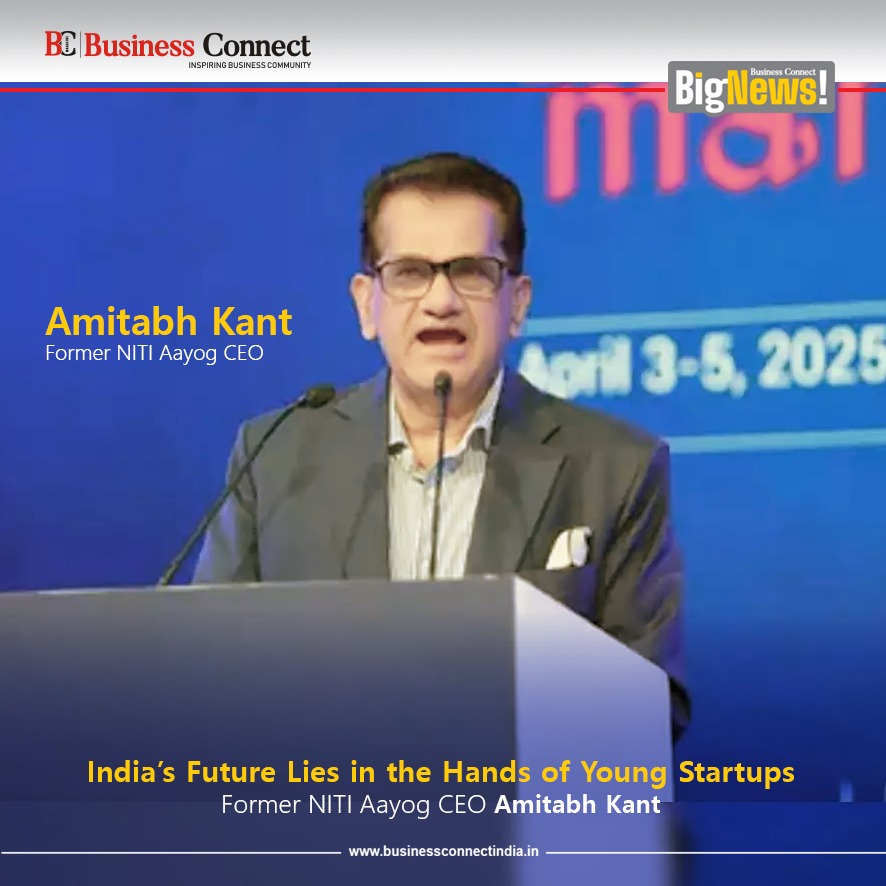India stands at a pivotal moment in its journey toward becoming a global economic powerhouse. While corporates have long been the backbone of the nation’s growth, former NITI Aayog CEO and current G20 Sherpa Amitabh Kant believes the real catalyst for India’s advancement lies elsewhere—in the innovation and dynamism of young startups.
Speaking at the Startup Mahakumbh 2025 event in Delhi on April 3, 2025, Kant emphasized that the future of India hinges on the ability of its startup ecosystem to drive cutting-edge innovation in sectors like artificial intelligence (AI), deep tech, and green technology.
Beyond Corporates: The Startup Revolution
For decades, India’s economic narrative has been shaped by large corporations, delivering scale, stability, and global reach. However, Kant argues that this model alone cannot propel India into the next phase of growth. “Corporates have played their part, but the advancement of India now depends on the creativity and agility of young startups,” he said during his keynote address. With over 1.61 lakh recognized startups as of 2025—up from just 400 in 2016—India’s startup ecosystem has emerged as the world’s third-largest, a testament to the Startup India initiative’s success.
Kant’s vision shifts the spotlight to young entrepreneurs who are leveraging India’s data-rich environment to innovate at scale. “This decade will mark India’s transformation from a service provider to a global innovator,” he noted, urging startups to move beyond conventional sectors like e-commerce and food delivery and dive into deep tech domains such as AI, SpaceTech, geospatial intelligence, drones, electric vehicles (EVs), battery storage, and the circular economy.
Latest Updates: Startup Mahakumbh 2025
The Startup Mahakumbh 2025, held from April 2-4, has been a landmark event showcasing India’s entrepreneurial spirit. On Day 2, Kant highlighted India’s evolution from a “catch-up economy” to an innovation hub. He pointed to the government’s recent proposal to establish a Rs 10,000 crore fund of funds to boost early-stage investments in deep tech startups—an initiative aimed at fostering patient capital for long-term innovation. This move aligns with Kant’s call for startups to develop sovereign AI models using indigenous datasets, free from Western biases, to preserve India’s cultural identity and technological autonomy.
The event also saw Kant address the competitive landscape, noting China’s dominance in solar (70% market share), batteries (74%), and EVs (80%). “India must make a quantum leap in these areas,” he said, encouraging startups to disrupt these sunrise sectors with homegrown solutions. Meanwhile, the Department for Promotion of Industry and Internal Trade (DPIIT) reported a surge in startup registrations, with over 100 new unicorns emerging in the past year alone, further solidifying India’s position on the global stage.
The Role of Young Innovators
Kant’s belief in startups stems from their ability to “do more with less.” Unlike corporates, which often rely on established systems, startups bring agility, risk-taking, and a willingness to challenge the status quo. “Open-source innovation will be the way forward,” he remarked, advocating for collaborative models that harness India’s vast talent pool. From AI-driven healthcare solutions to green energy breakthroughs, young entrepreneurs are already reshaping industries and addressing pressing national challenges like sustainability and urbanization.
Take, for instance, the rise of EV startups like Ather Energy and Ola Electric, which are pushing India toward cleaner mobility, or companies like Skyroot Aerospace, pioneering affordable space launches. These ventures exemplify the disruptive potential Kant envisions—startups that not only compete globally but also address India’s unique needs.
A Call for Self-Regulation and Governance
While optimistic, Kant also sounded a note of caution. At Startup Mahakumbh, he stressed the importance of self-regulation within the startup ecosystem. “Chasing valuations at all costs can lead to misgovernance,” he warned, urging founders to prioritize transparency and ethical practices. This balance, he believes, will build trust with stakeholders and ensure sustainable growth, positioning startups as “national assets” rather than fleeting ventures.
The Road Ahead
Kant’s vision aligns with India’s broader economic goals. With a GDP of $3.7 trillion—making it the world’s fifth-largest economy—India aims to reach $35 trillion by 2047, surpassing Japan and Germany. Startups, he argues, will play a critical role in this journey, driving innovation at population scale in sectors like digital identity, logistics, health, and education. The government’s supportive policies, such as tax exemptions and eased FDI norms, further bolster this ecosystem.
As Kant concluded, “India’s story has just begun.” With young startups at the helm, the nation is poised to leapfrog into a future defined by technological sovereignty and global leadership. The message is clear: while corporates laid the foundation, it’s the ingenuity of India’s youth that will build the skyscrapers of tomorrow.
Add Business Connect magazine to your Google News feed



